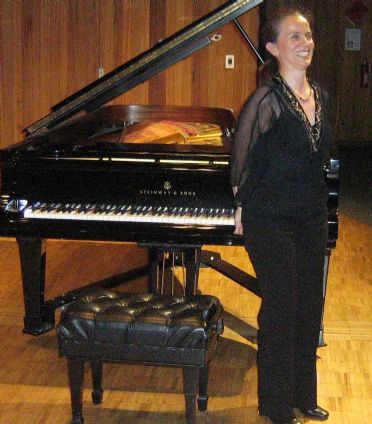|
Symphony
SRS SEASON ENDS WITH RESOUNDING TA-TA-TA-BANG
by Terry McNeill
Sunday, June 1, 2025
Symphony
YOUTHFUL VIRTUOSITY ON DISPLAY AT USO'S MAY CONCERTS
by Peter Lert
Saturday, May 17, 2025
Symphony
MYSTICAL PLANETS AND LIVELY GERSHWIN ORTIZ AT FINAL SRS CONCERT
by Peter Lert
Sunday, May 4, 2025
Symphony
VSO'S CONCERT MUSIC OF TIME, MUSIC OF PLACE
by Peter Lert
Sunday, April 27, 2025
Choral and Vocal
VOCAL ELEGANCE AND FIRE AT THE 222'S RECITAL APRIL 26
by Pamela Hicks Gailey
Saturday, April 26, 2025
CANTIAMO SONOMA SINGS AN INSPIRED GOOD FRIDAY MOZART REQUIEM CONCERT
by Pamela Hicks Gailey
Friday, April 18, 2025
DRAMATIC SHOSTAKOVICH SYMPHONY CLOSES PHILHARMONIC'S 25TH SEASON
by Terry McNeill
Sunday, April 13, 2025
LARGE COLLEGE OF MARIN AUDIENCE GREETS STOPHER ARTISTRY
by Terry McNeill
Saturday, April 5, 2025
Chamber
FRISSON DELIVERS SHIVERS OF DELIGHT
by Abby Wasserman
Sunday, March 30, 2025
OLD AND MOSTLY NEW IN SRS MARCH CONCERT IN WEILL
by Peter Lert
Saturday, March 22, 2025
|
 |
 Zeynep Ucbasaran Receives Applause after Liszt's Grand Paraphrase |
CHOPIN SCHERZOS FEATURED IN UCBASARAN RECITAL
by Terry McNeill
Sunday, March 28, 2010
Chopin’s bicentennial received another boost March 28 as pianist Zeynep Ucbasaran played a Newman Auditorium concert devoted mostly to the works of the great Polish master.
In the penultimate series recital in the seventh Concerts Grand season, Ms. Ucbasaran presented a program built around three of the Scherzos, with bookends of Adnan Saygun’s Aksak Studies one through five, and a Liszt paraphrase. The richly chromatic Polonaise-Fantaisie, Op. 61, from late in Chopin’s short life, was added to the mix, replacing several short works and the “Heroic” Polonaise. Scherzo is defined as a musical joke, but Chopin’s four are hardly that. Each (the popular B-Flat, No. 2, was omitted) contains virtuosic writing with cascades of notes, many repeats and lots of fortissimo.
In the first Scherzo in B Minor, Op. 20, Ms. Ucbasaran underlined the work’s restless nature, making the theme on the contrasting lyric section more pronounced. The C-Sharp Minor (No. 3) opened with the requisite presto con fuoco tempo and a lovely the chorale-like melody in D Flat. The spray of leggierissimo arpeggios were played well, if a bit repetitiously and often too quickly. The final Scherzo in E Major, Op. 54, was played with a deliberate tempo and found the pianist being taxed technically and without a big sound, though Ms. Ucbasaran gave the vocal piu lento section a languorous and nostalgic reading.
In the A Flat Polonaise-Fantaisie the music became under the artist’s fingers a small tone poem, the opening chords creating sufficient mystery to give the impression of continuous organic growth of the themes. The loose formal structure of this unique work makes it difficult to hold together, but Ms. Ucbasaran had all under control. The three sets of trills in both hands during the middle of the Polonaise were crystal clear.
Turkish composer Saygun’s Aksak sketches began the concert, music as unfamiliar to the 80 attending as it was well received. As a compatriot of the composer, Ms. Ucbasaran plays these works (from 1969) with special flair and rhythmic excitement, and has recorded them. The piquant sonorities were refreshing and the tempos were relaxed and the phrasing elegant.
At the end of Liszt’s touring career he found himself in Istanbul, and after hearing a theme from Donizetti’s brother (the composer in residence) he wrote a Grand Paraphrase de la Marche de Giuseppe Donizetti, and dedicated it to Sultan Abdul-Medjid Kahn. Surely a premiere performance in the North Bay, Ms. Ucbasaran gave the tough repeated notes and swirls of sound a fast ride. But it’s bottom-drawer Liszt, not comparable to the great operatic paraphrases of Verdi, Bellini, Wagner and Mozart. It was good to hear a novelty, but the music faded quickly after the pianist took bows to loud applause.
Two encores were offered, beginning with Chopin’s delicate triplet finger study in the Etude in F Minor, Op. 25, No. 2. The second was 20 measures from ending of the Third Scherzo, a strange abbreviation with yet more fleet and strident notes.
The reviewer is the producer of the Concerts Grand series.
|

